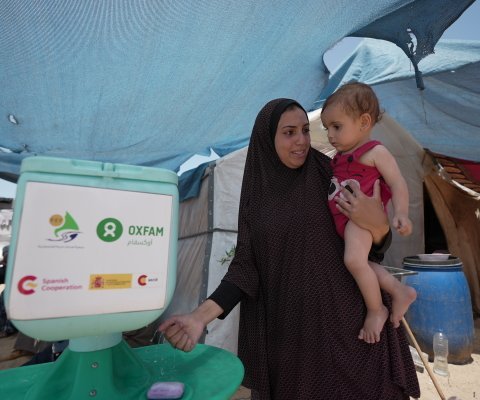The international community must plug a $2 billion funding gap for countries hit by El Nino-related drought and storms. These have left a staggering 60 million people around the world facing crop failures and worsening hunger.
The UN is convening a meeting of countries today (April 26) in Geneva to pledge money to those affected by El Nino.
“Once again the UN has to go cap-in-hand to its country members, pleading for cash to help desperate and hungry people. Millions of people – nearly the equivalent populations of Italy or the UK – are depending upon how generous they feel on the day. This appeal must not fall short,” said Oxfam humanitarian policy expert Debbie Hillier.
The UN has already raised $1 billion for global El Nino relief which is welcomed. However Oxfam is critical that the international community can organise itself to provide predictable and ready funding for some issues – such as UN peacekeeping, even for managing fish stocks – but not for people facing hunger crises.
“If a country sits on the International Commission for the Conservation of the Atlantic Tuna, for instance, it pays a member levy and the commission does its job. The international community is happy to organise itself and pay a levy in order to save fish – surely we can devise a better process to help hungry people too?” Hillier said. “El Nino highlights a deep failure of principle in the humanitarian system.”
Half of the 60 million people who need support live in Southern Africa. Many countries across five continents have called states of emergency, including in Central America and in the Pacific. Haiti’s crop losses are as much as 50%. Ethiopia is among those experiencing one of their worst droughts in history.
Oxfam has published a paper “What will become of us?” capturing the voices, stories and images of some of those affected.
“Millions of people are going to bed on empty stomachs, children are going to school hungry, mothers are unable to breastfeed, people are losing livestock” said Hillier, whose work with Oxfam’s country teams went into the report.
“Many people have nothing really left. Once their crops fail and their animals die, they’re left drained of savings, and forced to borrow, sell their assets or migrate. Women and girls are left shouldering the brunt: dropping out of school, entering forced marriage, facing higher risks of violence as they trek further for wood, food and water.”
“The scale of this problem is overwhelming for many affected governments,” Hillier said. “This slow onset disaster is not getting the media coverage that reflects the extreme amount of hardship being caused. We urge governments to pledge generously today. We also need this problem acknowledged as further proof that the world’s humanitarian system needs over-hauling.”





